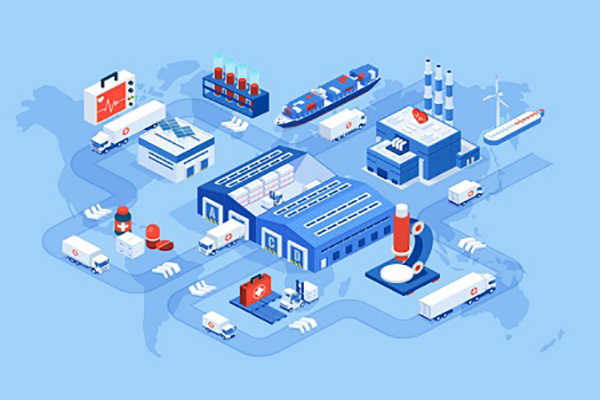In the ever-evolving landscape of the pharmaceutical sector in India, the pressing need for an efficient and reliable cold supply chain has taken centre stage. Especially after the global COVID pandemic, the significance of a seamless and tech-enabled cold supply network has been well understood and its role in ensuring the safe and timely delivery of temperature-sensitive medicines across the Indian subcontinent has become a vital one.
As per the World Health Organization (WHO), approximately 50% of vaccines globally are wasted each year due to temperature control issues in the supply chain, emphasizing the urgent need for a comprehensive solution. India is no different.
The trajectory of the pharmaceutical sector in India is intricately linked to the transformation of its cold supply chain. The journey from the current INR 1,678.79 billion market value in 2023 to the projected INR 3,742.98 billion by 2032 signifies not just economic growth but a commitment to safeguarding public health.
As India stands at the crossroads of a transformative era, embracing a seamless and tech-enabled cold supply chain is not just a strategic imperative but a moral obligation. It is a pledge to ensure that every citizen, regardless of location, has access to quality pharmaceuticals. However, India’s diverse topography and climatic variations require adaptable solutions, ensuring the integrity of the cold supply chain in remote or difficult-to-access areas remains a hurdle. Additionally, power outages and infrastructure limitations demand innovative solutions such as solar-powered cold storage units and efficient backup systems.
A solid, tech enabled cold supply chain can significantly enhance pharmaceutical supply chains by addressing these unique challenges posed by temperature-sensitive products. Here are several ways in which a robust cold supply chain can contribute to the improvement of pharmaceutical supply chains:
Implementing Real-time Monitoring Technologies:
Integration of technologies like IoT and RFID enables real-time monitoring of temperature, humidity, and other critical parameters. This ensures immediate detection of any deviations, allowing for timely interventions and preventing potential product damage.
Preserving Product Integrity:
Tech enabled Cold supply chains help consistent temperature monitoring and real time updates, to ensure that temperature-sensitive pharmaceuticals, vaccines, and biologics are transported and stored within specified temperature ranges, at all times, thus preserving their efficacy and safety.
Reducing Product Loss and Wastage:
Precise temperature control minimizes the risk of product spoilage and degradation, leading to reduced product loss and wastage. This, in turn, contributes to cost savings for pharmaceutical manufacturers.
Enhancing Quality Control:
Real-time monitoring and data analytics in cold supply chains allow for proactive quality control measures. Any deviations from optimal conditions can be identified and addressed promptly, maintaining the overall quality of pharmaceutical products.
Improving Regulatory Compliance:
Stringent regulatory requirements demand adherence to specific storage and transportation conditions for pharmaceuticals. A reliable cold supply chain helps pharmaceutical companies comply with regulatory standards, avoiding legal implications and ensuring product safety.
Minimizing Transit Time:
Tech enabled cold supply chains can optimize transportation routes and methods, reducing transit time. This is crucial for time-sensitive pharmaceuticals, especially vaccines and certain medications, ensuring they reach their destination swiftly without compromising their efficacy.
Expanding Reach to Remote Areas:
A well-established cold supply chain infrastructure facilitates the distribution of pharmaceuticals to remote and underserved areas. This expansion of reach contributes to improved healthcare access and equity.
Optimizing Inventory Management:
Cold supply chain solutions provide better control over inventory management by offering real-time visibility into the location and condition of pharmaceutical products. This optimization minimizes overstocking or stockouts, improving overall supply chain efficiency.
Ensuring Continuity in Emergency Response:
Through all of the above tech enabled solutions, Phara supply chains can evolve into robust networks which can become life savers in time of public health emergencies or natural disasters. It ensures the continuous supply of life-saving pharmaceuticals to affected areas, aiding in effective emergency response efforts.
The Indian Cold supply chain sector has been a resilient one, as established during the crisis of the COVID pandemic. Its commitment to overcoming challenges are reflected in the market growth projections. The Indian cold chain market is expected to reach INR 3,742.98 billion by 2032, showcasing a compound annual growth rate (CAGR) of 14.3% from 2024. This substantial growth is a testament to the industry’s response to the increasing demand for a reliable and efficient cold supply chain.
However, to truly establish itself as a global pharmaceutical powerhouse, India must align its cold supply chain standards with international benchmarks. Adhering to global best practices ensures that Indian pharmaceuticals not only meet domestic standards but also gain acceptance in the international market. This alignment fosters competitiveness and opens up new avenues for exports, strengthening India’s position on the global pharmaceutical stage. The journey toward a tech-enabled cold supply chain is not just a business imperative; it is a prescription for a healthier, more connected future for all.















